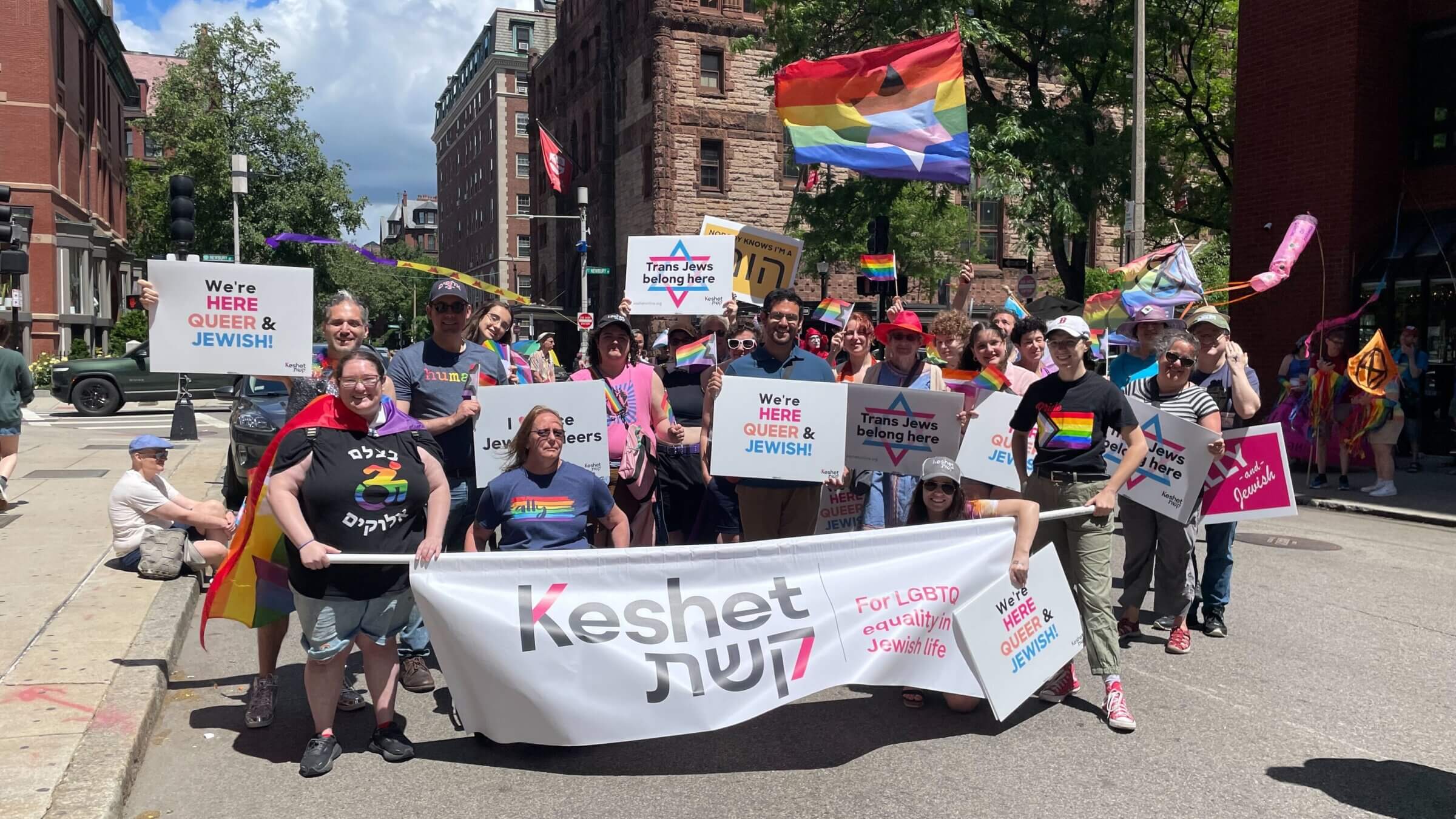Can this LGBTQ+ Jewish organization navigate these turbulent times?
Keshet is experiencing a CEO transition and external pressures. It hopes its latest project, Shivyon, eases them

Community members march with Keshet in Boston Pride, June 8, 2024. Courtesy of Keshet
Nonprofit Keshet has been a leading advocate for Jewish LGBTQ+ rights for nearly three decades.
This year, however, longtime CEO Idit Klein stepped down, while at about the same time, the Trump administration was ramping up its policy assault on the LGBTQ+ community. (It recently mandated that U.S. passports for transgender people must now reflect the sex on their original birth certificate, reversing a decades-old policy.)
The question was not whether Keshet would plot a path through this challenging period, though. It was how.
The organization’s latest educational offering, the Shivyon Project, offers a window into its evolving priorities, as it contends with this less-than-agreeable federal administration and, in select pockets of the country, a recrudescence of anti-LGBTQ+ sentiment.
Shivyon, as it’s known, provides Jewish organizations — JCCs and synagogues are Keshet’s most frequent clients — with an “action plan” aimed at improving an institution’s LGBTQ+ policies. It’s a collaborative and customizable endeavor, so the specifics can vary. “This is not one size fits all,” said Rabbi Micah Buck, Keshet’s Director of Education and Training. Once a blueprint is agreed upon, Keshet’s trained professionals provide coaching and guidance over the course of a year, by the end of which — all having gone smoothly — the plan has become reality.
Thoughtful and soft-spoken, Buck acknowledged that this was hardly a straightforward moment for the organization. “We are living in a time in which LGBTQ+ identities, especially transgender and non-binary and gender expansive identities, have become inappropriately politicized,” he told me.
Demand for Keshet’s services in general, and for Shivyon in particular, has duly shot up. “For so many LGBTQ+Jews, safety and belonging in our Jewish communities feels more urgent and needed than ever before,” said Buck.
Though Shivyon grew out of the ‘Leadership Project,’ Keshet’s first foray into general community education more than a decade ago, it is “drastically different” from any of the organization’s previous cohort-based programs, Buck said. After all, Shivyon has been rolled out against a somewhat unusual split backdrop: On the one hand, recent political turbulence; and on the other, a sustained effort by the mainstream Jewish community to embrace LGBTQ+ Jews.
“Organized segments of Jewish life have made tremendous progress celebrating LGBTQ+ identity,” Buck said. “And we are seeing greater and greater numbers of the LGBTQ+ community in positions of leadership and influence.” The non-orthodox rabbinate, for example, is often cited as both an incubator for and testament to the improving integration into mainstream Jewish life of the LGBTQ+ community; the sheer number of LGBTQ+ students attending rabbinical school has, in fact, become something of a phenomenon in its own right.
With Shivyon, then, Keshet had to strike a fine balance: gesturing sufficiently at the dangers of the current political moment, while also recognizing and incorporating into its curricula the advances of LGBTQ+ Jews during the previous decade.
One solution, Buck told me, was to talk about belonging rather than inclusion, a shift in emphasis that has shown up in ways both grand and unassuming.
Take Congregation Beth Shalom, a Conservative synagogue in Dallas, and one of Shivyon’s participating congregations. It recently became the first Conservative synagogue to march in the Dallas Pride Parade — a milestone made possible, said its executive director Katie Babin, by Shivyon’s success in making Beth Shalom’s “queer community feel fully included and embraced.”
Yet no less significant were the “small but intentional changes” Beth Shalom instituted, Babin told me over email — most notably updating the language on its membership applications. This kind of attention to the fine print is an integral part of Shivyon, too, the substance to go along with the symbolism.
Textual analysis has been Shivyon’s other calling card, Buck told me, an excellent source of community and common interest. “We can find clear indications of LGBTQ+ Jewish presence forever,” said Buck. “For so many people in our community, one of the moments that can be really beautiful is encountering that sense of: My ancestors have always been here.”
As for the present political challenges, Keshet has opted to double down on its values-based approach. “For all the weaponization of people’s identities,” Buck said, “the basics of access, dignity and celebration are not fundamentally sites of division within the Jewish community.”

















